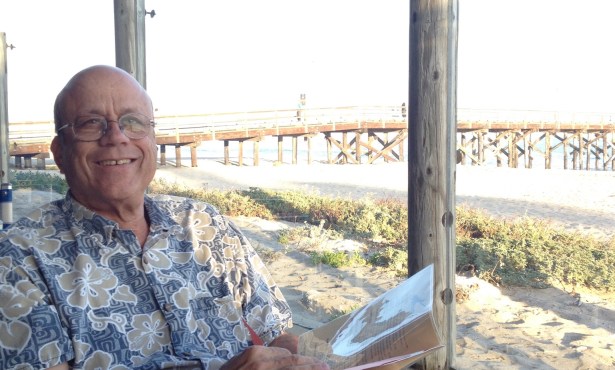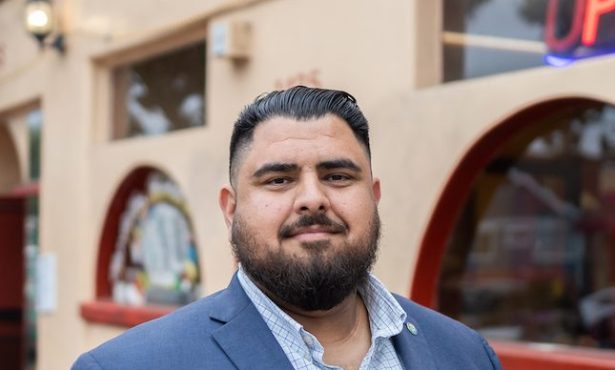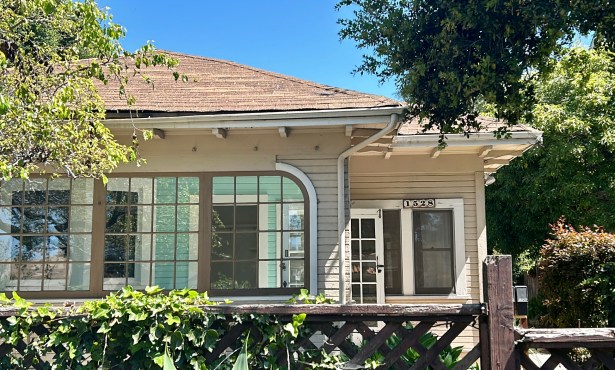Gay Pride in Rocinha!
Gayz n the Brazilian Hood
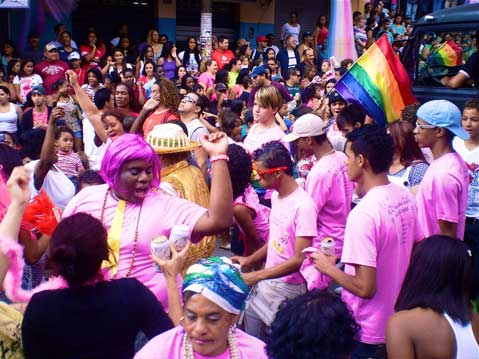
November 25 was a colorful day here in Rocinha. That’s an understatement. It was perhaps the most colorful day in the history of favelas (Brazilian slums), because that festive Sunday marked the first time a gay pride parade was ever held in a favela.
It started around two in the afternoon, relatively high on the hill on which the community resides. A giant truck with a stage on top, and speakers playing Gloria Gaynor, Lady Gaga, and the like served as the centerpiece for the initial gatherings, which featured free beer and hundreds of costumed celebrators. Community member Luiz Fernando summed it up perfectly. “This is just the best!” he raved. “Everybody is just too beautiful … Simply marvelous!”
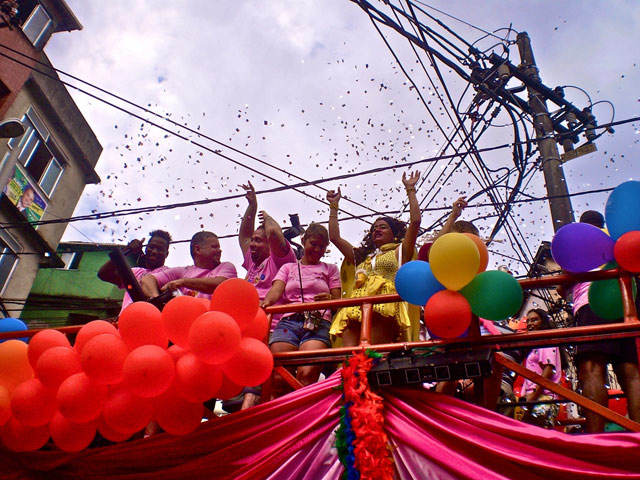
The street filled over the next few hours with an estimated 18,000 people. They were members of the lesbian, gay, bisexual, transgender (SGBT) community, plus their friends, families, kids, curious community members, free beer moochers, and a swarm of local reporters. Many were dressed in drag, complementing the attendance of a few of Rio’s most famous drag queens. Late in the afternoon the tipsy crowd mobilized in preparation for the parade itself, which followed the giant music-booming truck’s snail-paced descent down Estrada de Gávea, Rocinha’s main, winding road, down toward the community’s entrance.
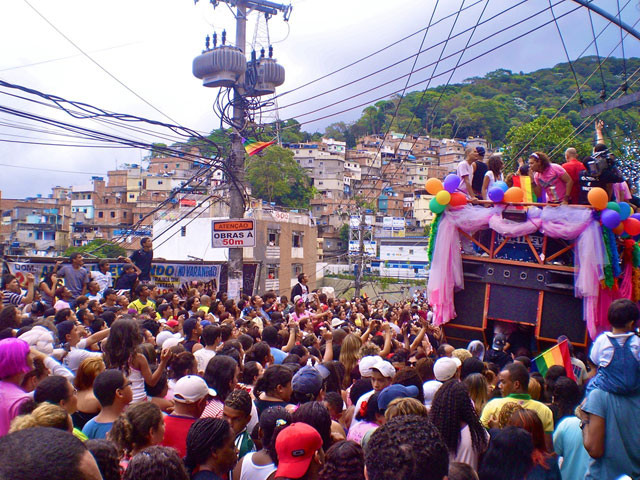
There, the party around the music truck would long outlast sundown. And after that, the music moved to an enormous temporary stage down the street. Over the 16 hours or so of festivity, close to 50,000 people came out, according to event organizers. Those with endurance kept dancing funk until sunrise.
From a foreign perspective, the parade might not seem so momentous. Rio de Janeiro is the most visited tourist destination in Latin America, and almost one third of its visitors are part of the global LGBT community. But in such a touristy, socially segregated city, visitors and lower class citizens live in worlds apart. Gay tourists to Rio de Janeiro rarely stray from the gay beach in the Ipanema neighborhood, or the bars and clubs on “gay street,” Farme de Amoedo, directly across from the beach. These visitors will mostly only interact with other gay tourists and Brazilian “Barbies”—the tan, muscular, wealthy gay men whose day job seems to be nearly-naked perching on the beach in Ipanema.
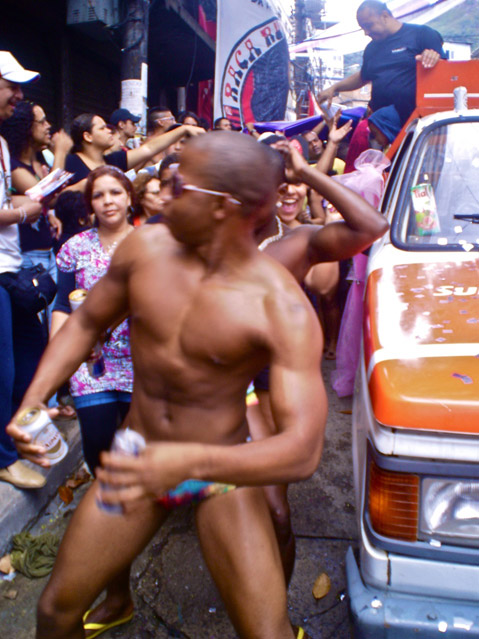
But to be born and raised in a favela poses challenges unfamiliar to the short-term Ipanema tourist. Rocinha has a considerable LGBT community, but the conservative Christian community is much bigger and more powerful. In fact, all favelas are relatively socially conservative in Rio, and have a strong church presence. While sexuality is a very open subject, it’s strictly heterosexual, featuring dominant, even overpowering male roles and very traditional, even submissive female roles. (Evidence of these gender relations can be found in lyrics of popular music or simply by observing people, both young and old, hanging out in groups or as couples anywhere in the community.)
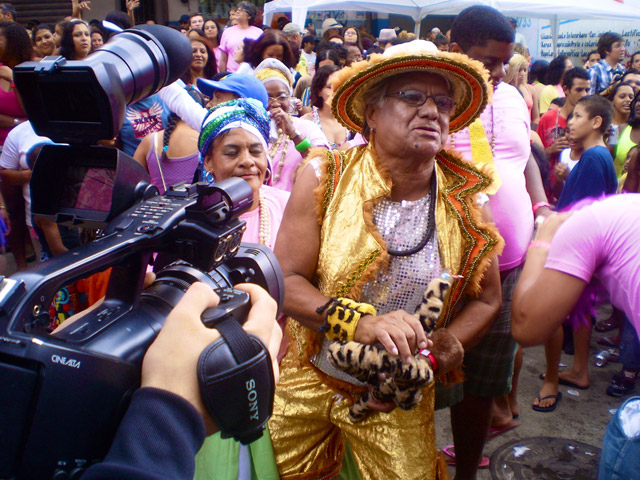
Through chatting with friends who are members of it, and through simple observation, I have noticed a particular phenomenon in the favela’s LGBT community. It’s one of extremities. There seems to be little recognition of “the spectrum” between hetero- and homosexual. Whereas in the States openly gay people may be difficult to pick out, in the favela, gayness is their main defining characteristic. I imagine coming out here to be much more of a commitment; to be much more of the assumption of a distinct and immoble identity, than in more liberal communities in Rio and elsewhere in the world. Everybody knows who Rocinha’s main crew of teenaged gays is. If they were in another neighborhood they would probably not be such an isolated group. As far as I can tell, however, they don’t seem to have complaints.
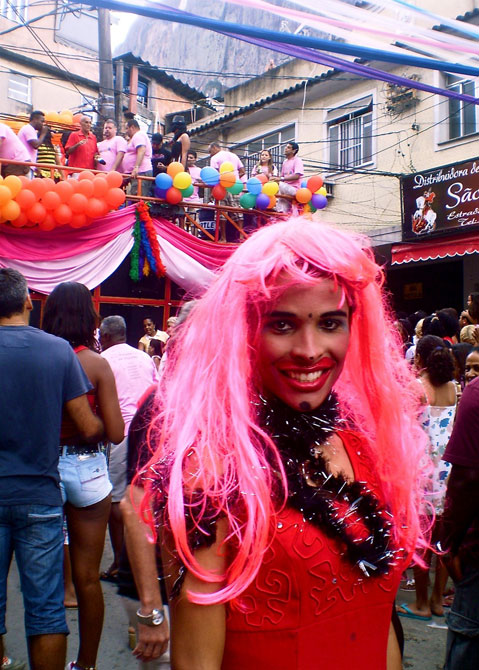
The Association of Rocinha Residents spent under a week organizing the event. According to the principal organizers, who are also participants in Academicos da Rocinha, the community’s Samba School, community members had no sooner requested it than preparations more or less immediately began. It was relatively easy to arrange music, MCs, t-shirts, free beer, a stage, and DJs. On the very eve of the parade, they rallied community members, mostly of the LGBT community, to spend all night decorating Estrada de Gávea with rainbow-colored ribbons, balloons and streamers.
The favela at large was very supportive. In fact, it seemed the entire city was. It was logical that the first favela gay pride event should take place in the city’s largest, and perhaps most diverse, favela. People came from all over Rio–from all over Brazil, even. Armed bandidos appeared at the street party later that night– some in costume–to enforce tranquility and sell drugs (mostly to outsiders). Many straight men took the opportunity to cross-dress, which is a Carnaval tradition for many Brazilians regardless of where they fall on the spectrum. If not for this event, their costumes would have sat in the closet until March 2011.
Negative reactions to the event came primarily from churches and strongly traditional people. Almost all churches hosted events the same day as the parade (it was a Sunday, after all) and many residents, mostly old people, could be seen at the windows perched over the over the streets, shaking their heads.
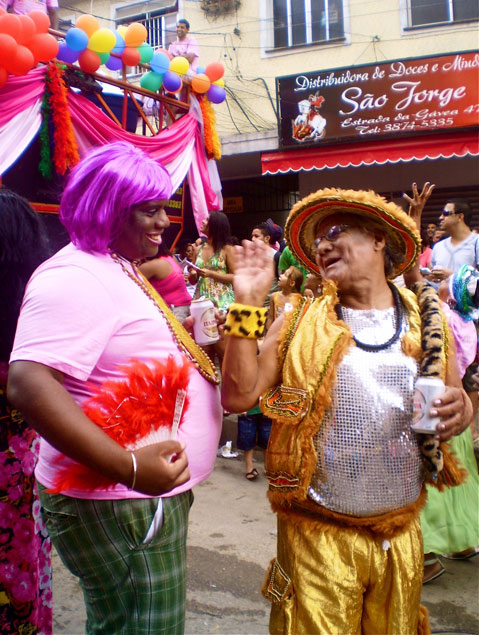
Rio de Janeiro is already host to one of the world’s biggest gay pride parades, on super-touristy Copacabana beach. The NGO Arco-Iris (Portuguese for “rainbow”) will hold the 15th annual parade on November 15 of this year. But Rio has never seen such an event come to a favela. The impressive turnout and warm welcome for the event in Rocinha were major steps in LGBT acceptance. For me it ranked up there with Carnaval and Brazil World Cup game days for the most extravagant mass celebrations I’ve experienced in Brazil. I imagine the Parada Gay da Rocinha becoming an annual festivity.

